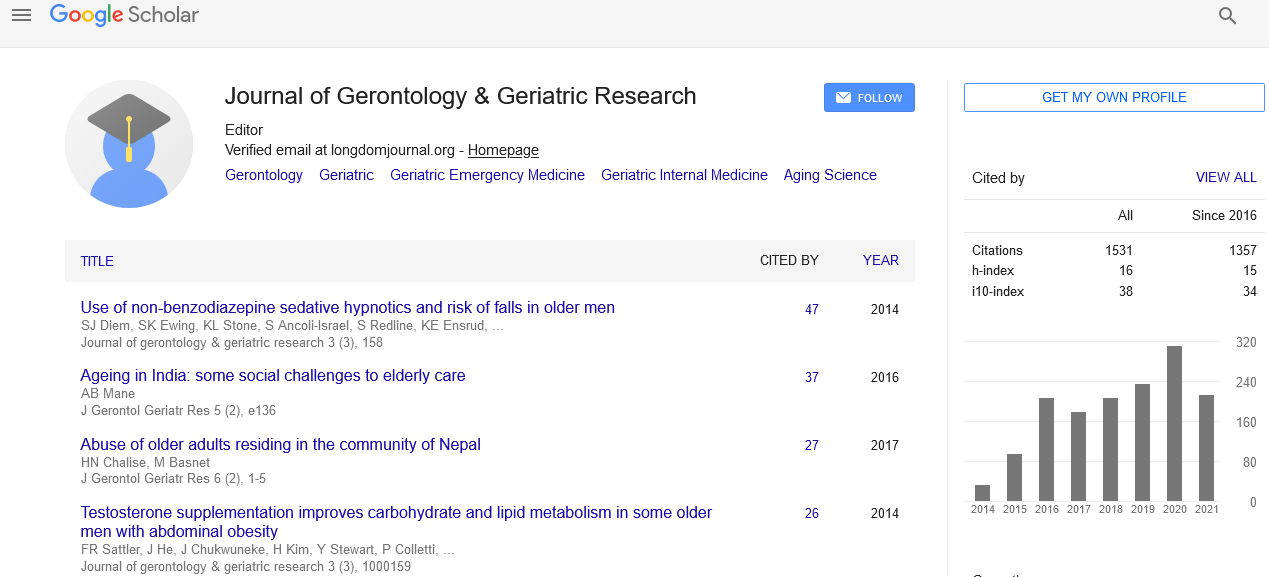PMC/PubMed Indexed Articles
Indexed In
- Open J Gate
- Genamics JournalSeek
- SafetyLit
- RefSeek
- Hamdard University
- EBSCO A-Z
- OCLC- WorldCat
- Publons
- Geneva Foundation for Medical Education and Research
- Euro Pub
- Google Scholar
Useful Links
Share This Page
Journal Flyer

Open Access Journals
- Agri and Aquaculture
- Biochemistry
- Bioinformatics & Systems Biology
- Business & Management
- Chemistry
- Clinical Sciences
- Engineering
- Food & Nutrition
- General Science
- Genetics & Molecular Biology
- Immunology & Microbiology
- Medical Sciences
- Neuroscience & Psychology
- Nursing & Health Care
- Pharmaceutical Sciences
Pain assessment and management in elderly palliative care patients
International Conference on Geriatrics & Gerontology
July 08-10, 2014 DoubleTree by Hilton Hotel Chicago-North Shore Conference Center, USA
Karima Elshamy
Accepted Abstracts: J Gerontol Geriat Res
Abstract:
The goals of palliative care are to control symptoms in patients with advanced disease and enhance their quality of life. Many cancer patients have more than one pain syndrome, and multiple medications are often indicated, and more than 70% of cancer patients report pain, and more than 36% of patients with metastatic disease have pain severe enough to impair function. Pain not only adversely affects the quality of life of patients, but also may force otherwise independent individuals to become prematurely institutionalized when they can no longer be managed at home. The mainstay in the treatment of cancer pain is pharmacologic intervention. Nonpharmacologic techniques, however, are also effective in relieving cancer pain. These interventions can be divided into physical and psychosocial modalities. Despite the growth of palliative care in many countries, the majority of patients die outside of their homes, and many do not receive adequate control of their symptoms. Pain also can be psychologically devastating because it can be a constant reminder of the incurable and progressive nature of the disease. Although education and training have increased for physicians and nurses in the management of pain, many patients do not receive adequate analgesia. Principles of good pain management include a thorough initial assessment and frequent reassessment to monitor the efficacy of treatment and the onset of side effects. Physicians and nurses need to be knowledgeable of the types of pain syndromes while assessing pain, and frequent assessment, rapid intervention, and appropriate use of opioids and their adjutants are requisites for adequate pain control and an optimal quality of life. This presentation will focus on, and discuss pain management in palliative care and the management strategies.
Biography :
Karima Elshamy has a Doctorate degree in Nursing Science from Cairo University, Egypt (DNSc). She is a Professor of Medical Surgical Nursing and Head of Gerontological Nursing Department, Faculty of Nursing, Mansoura University, Egypt. She represented AORTIC Nursing of North Africa since 2009 ? 2011, and from 2011 - 2013 she was AORTIC Vice President of Oncology Nursing, and now she is AORTIC Vice President of North Africa. She is a member of the Editorial Board of the Journal of Cancer Policy. She is Accreditation Reviewer in Ministry of Health, Egypt. She is a founder and executive director of the Egyptian Society for Promotion of Women?s Health.


